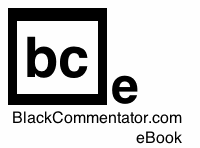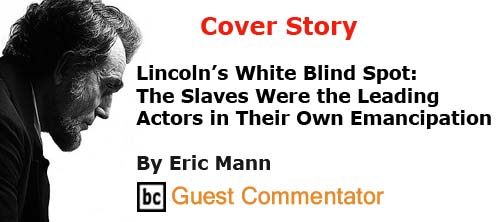

As the Oscars are just passed, I’d like to contribute to the discussion of Stephen Spielberg's Lincoln that is still in theaters, will be moving to Netflix, HBO, and pay per view, and as celebrated by the liberal media, will be an influential cultural and political force for a long time. As a civil rights organizer and coalition builder since my work with the Congress of Racial Equality 1964, I well understand that liberal projects can sometimes help the movement even if they do not go as far as we would like them to. But in this case, screenwriter Tony Kushner and producer Steven Spielberg made an aggressive, conscious, and harmful intervention to re-write Black history through a white lens and write Black people out of their own emancipation. In this case, I think it should be re-submitted for a new category that Hollywood perfects but does not yet publicly recognize: “Well-meaning pictures that do more harm than good.”
Lincoln is a film about white people debating, maneuvering, and fighting over whether or not to pass the 13th Amendment which stated—“Neither slavery nor involuntary servitude, except as a punishment for crime whereof the party shall have been duly convicted, shall exist within the United States, or any place subject to their jurisdiction.” But where were the Black historical and dramatic actors who were the real leads of the story—the 400,000 runaway slaves who forced the Union armies to accept them, and who put the heat on Lincoln to support their emancipation or lose the war? They were whited out of the film. Lincoln is not just historically inaccurate but tragically so—doing its greatest disservice to a new generation of Black youth whose people’s remarkable history in fighting slavery, leading the Reconstruction, fighting Jim Crow, leading the anti-Vietnam war movement, and creating the conditions for the election of the first Black president in the history of the United States has been stolen from them in a wave of mass imprisonment and aggressive revisionist history.
When
I first saw the film, I suspended disbelief and enjoyed it a lot. But
minutes after leaving the theater I realized that once again Hollywood
had deceived me and the person I was most angry at was myself
So, as soon as I got home I re-viewed the film through the lens of my greatest teacher, W.E.B. DuBois, and his master-work Black Reconstruction in America. Clearly, Lincoln’s support for the Emancipation Proclamation and the 13th Amendment was situated in the great slave rebellion that DuBois calls “the general strike.” As DuBois argues, “it was the fugitive
slaves who forced the slaveholders to face the alternative of
surrendering to the North or surrendering to the Negro.” DuBois
explains that it was the Black slave proletariat who fled the
plantations threatening the white folks with starvation. It was the
Black runaway slaves who put boots on the ground and made the Union
army accept them despite the opposition of many white northern
soldiers. They were eventually accepted by Lincoln, his generals, and
most of the white soldiers, because they were brilliant and ferocious
fighters against the Confederacy, many white Union soldiers were
deserting, and Lincoln feared they would lose the war without them. Two
hundred thousand Blacks served in the army and another 200,000 Blacks
served in food, construction, and support services. Without them the
North would have lost the war, or conceded to “reconciliation” with the
white South with slavery intact.
So
how was it possible that Tony Kushner and Steven Spielberg, good people
who have written an anti-slavery script, could interpret history in
ways that I believe have very destructive consequences? Surely they had
read DuBois, E. Franklin Frasier, Lerone Bennett, Frederick Douglass
and scores of other Black scholars who put Black people at the center
of the Civil War narrative. And when I read Team of Rivals: The Political Genius of Abraham Lincoln
by
Doris Kearns Goodman, on which the film-makers say the screenplay was
based, I was happily surprised that she has an entire chapter about the
critical role that Frederick Douglass and the runaway slaves played in
this story - none of which was reflected in Lincoln.
Douglass, as Kearns explains, recruited Black soldiers, including two
of his sons, for the Union Army and had a contentious, complex, and
influential relationship with Lincoln. Imagine a scene in which a
towering Douglass demands of a vacillating Lincoln that unless he
retaliates against the Confederacy ideologically and militarily for
their murdering of captured Black Union soldiers, Douglass would stop
all recruiting and distance himself from the Union cause. Douglass
thunders, in terms few would have dared, “What has Mr. Lincoln to say
about this slavery and murder? What has he said? Not one word…” Until
he shall “interpose his power to prevent these atrocious assassinations
of Negro soldiers, the civilized world will hold him equally with
Jefferson Davis responsible for them.” Lincoln apologizes and
re-assures Douglass that his caution is not vacillation and does act.
But that film, which has not yet been made, would show that it was the
pressure of Douglass and the Black soldiers who were leading
Lincoln—Blacks providing moral, political, and military leadership for
whites—challenging the myth of white supremacy that even many liberals
internalize and perpetuate. A tentative title: The Douglass-Lincoln
Debates.
And where is the scene of Harriet Tubman, who led raids on Southern plantations with Black troops that freed 750 slaves at a time? Imagine multiracial audiences cheering as a Black woman led Black soldiers burning down plantations as the fugitive slaves joined the Union army.
And what of the painful impact of films like Lincoln on progressive Black actors who observe that, with a few exceptions, the roles they are offered in Hollywood are caricatured, degrading, or none at all? If Black actors can’t get leading roles in a film about the civil war, can’t get roles playing Frederick Douglass and Harriet Tubman because they are not even in the picture, then the civil rights movement must confront, expose, and change Hollywood’s treatment of Black actors as invisible men and women.
Today, the challenge of the civil rights movement is again to free the slaves—the 1 million Black and 500,000 Latino prisoners in bondage “as a punishment for crime whereof the party shall have been duly convicted” and the millions more on probation and parole under constant police control. I work with so many brave Black youth facing privatization of their schools, constant police harassment, brutality, and arrest for just living their lives—and forming organizations to fight the school-to-prison pipeline. At a time when the system is denying these young, gifted, and Black women and men their own revolutionary history, a new generation of civil rights organizers must set the record straight.

BlackCommentator.com Guest Commentator Eric Mann, a veteran of the Congress of Racial
Equality, Students for a Democratic Society, and the United Auto
Workers is the author of Katrina’s Legacy: White Racism and Black Reconstruction in New Orleans and the Gulf Coast and Playbook for Progressives: 16 Qualities of the Successful Organizer
(Beacon Press). He the host of Pacifica Radio KPFK’s Voices from the Frontlines and director of the Labor/Community Strategy Center in Los Angeles. Click
here to contact Mr. Mann.





